The Secret Enemy of the Marijuana Legalization Movement

By:
Public support for marijuana legalization is at a record high in the United States, but not everybody is embracing reform.
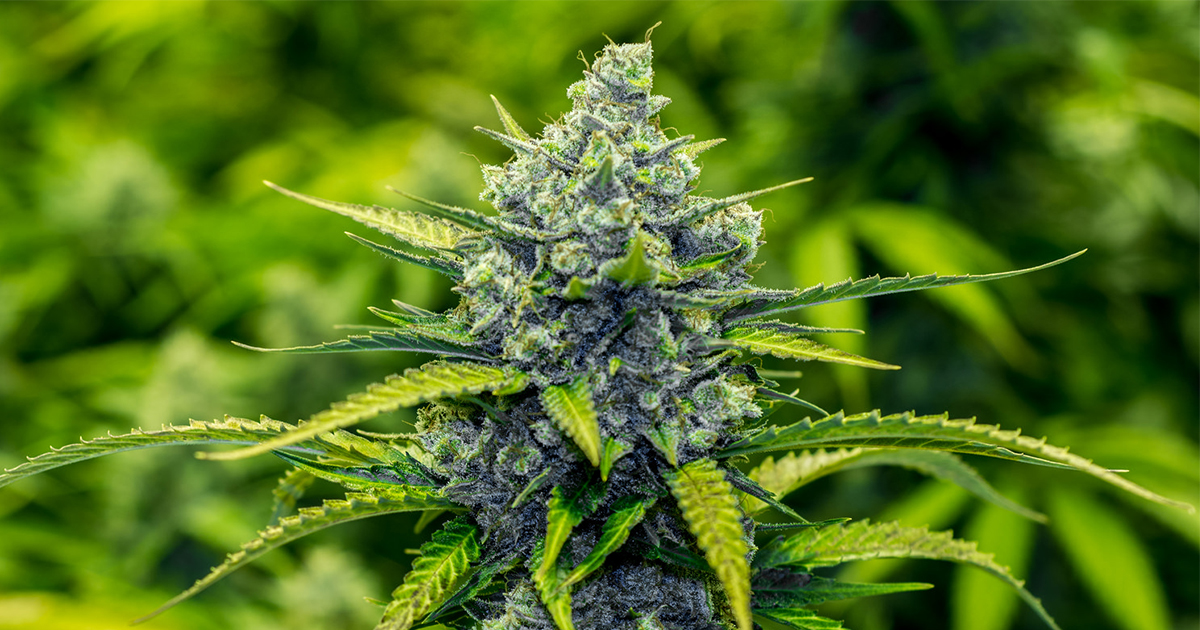 Flickr/Alex B - flic.kr
Flickr/Alex B - flic.kr
Certain industries have a financial interest in keeping weed illegal — private prisons, law enforcement, and Big Pharma, for example — but there's another opponent to legalization that most people don't think about: the drug-testing industry.
Against mounting evidence that drug testing is not cost effective, and that it unfairly targets marijuana users, the industry remains steadfast in its opposition to legalization. The reason? The industry has a lot at stake. There are those who argue it has a conflict of interest in opposing legalization efforts and is ignoring the facts to justify its fat revenues. More on this later.
In an effort to understand how and why many members of the drug-testing industry appear to be working against the marijuana legalization movement, ATTN: looked at federal lobbying records and talked to experts about the science and economics of drug testing.
How drug testing became a multibillion-dollar industry in the U.S.
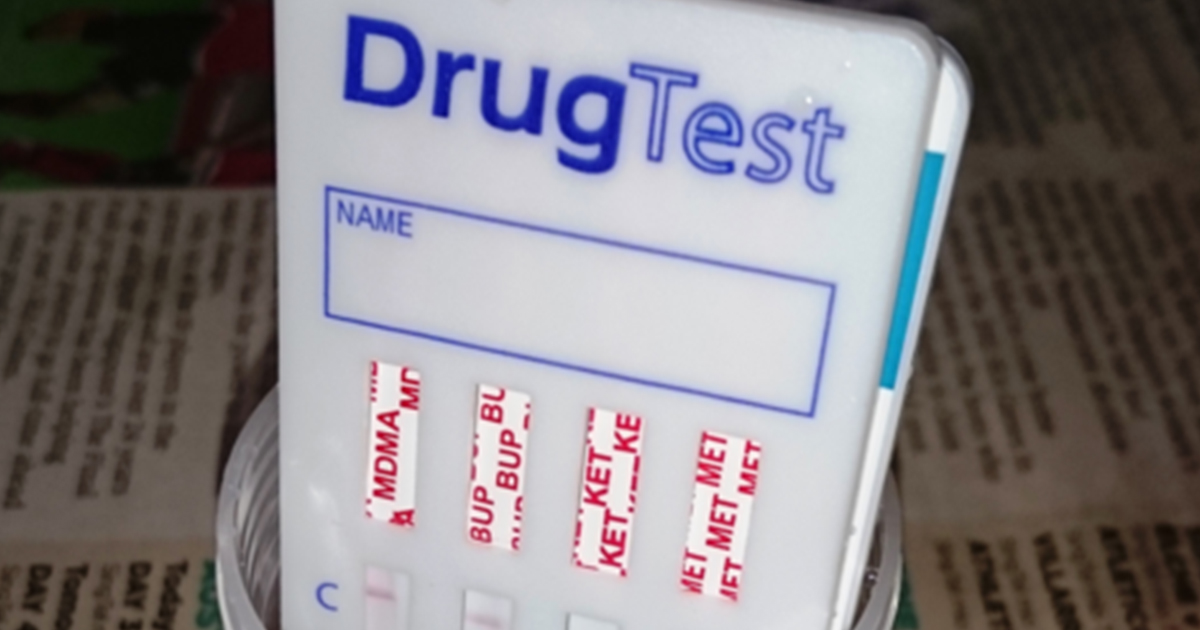 Wikimedia Commons - wikimedia.org
Wikimedia Commons - wikimedia.org
Urine tests didn't become a common workplace practice in the U.S. until the 1980s, when then President Ronald Reagan issued an executive order requiring federal agencies to implement drug-testing programs, The Nation reported. He later signed the Drug Free Workplace Act, which expanded mandatory drug testing to include employees working with federal grantees and certain contractors.
In the years since:
- Public and private employers have increasingly adopted drug-testing programs.
- Fifteen states have passed laws requiring public assistance recipients to submit to drug tests.
- More schools are starting to screen students involved in extracurricular activities.
- And this gradual expansion of drug testing has created a $4 billion industry that's expected to surpass $6 billion by 2019.
One of the problems with drug testing is that it's expensive.
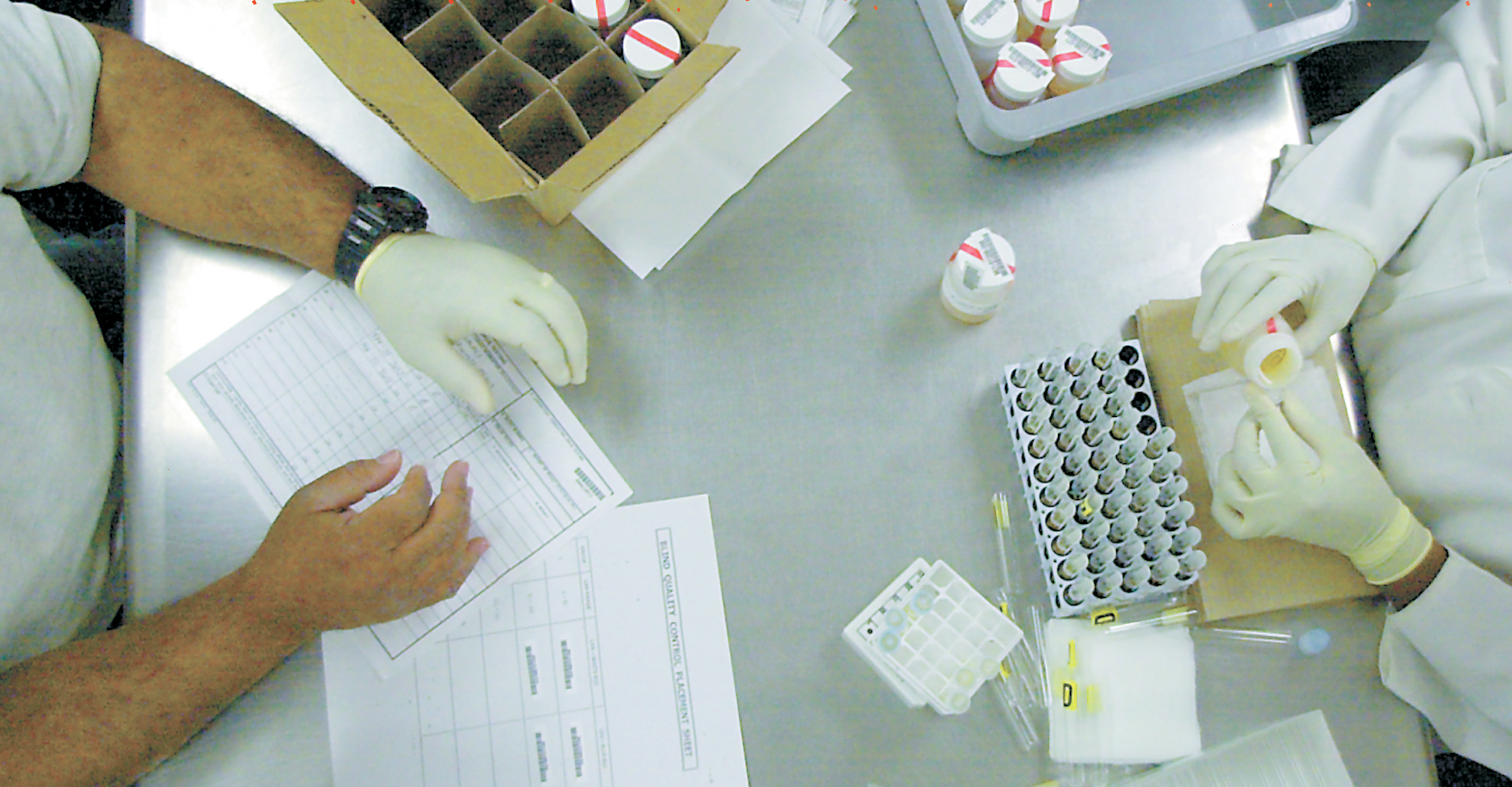 Wikimedia - wikimedia.org
Wikimedia - wikimedia.org
The average cost of a drug test is $42, and the vast majority of people who submit to these screenings pass. Quest Diagnostics, which offers drug testing services and has more than 25 years of data on results, found that just 4.7 percent of people tested positive for illicit drugs in 2014, a slight increase from 2013 (4.3 percent). A little over half of those — or 2.4 percent — tested positive for marijuana, a substance that has been legalized for either medical or recreational purposes in 24 states.
Employers, schools, and states that invest in drug-testing programs aspire to a drug-free gold standard, but the cost is steep. Would it still be worth the expense if only 2 percent of those tested come back with positive results?
"If you take marijuana out of the equation of the standard drugs that are screened for, you're going to have a very, very small percentage of employees ever flunking drug tests," Paul Armentano, the deputy director of the National Organization for the Reform of Marijuana Laws (NORML), told ATTN:. "In fact, that percentage might be so small that employers rethink their cost-benefit analysis on whether the cost of doing all of these tests are worth the reward of finding a very small minority of employees who may be testing positive."
How drug tests discriminate against marijuana users.
Marijuana is the most commonly used illegal substance in the U.S., so it makes sense that a majority of people who fail drug screens test positive for marijuana. But there's another factor at play that has led some to conclude that drug tests effectively discriminate against cannabis users: Marijuana stays in your system for significantly longer than other illicit drugs, as this chart from Business Insider shows.
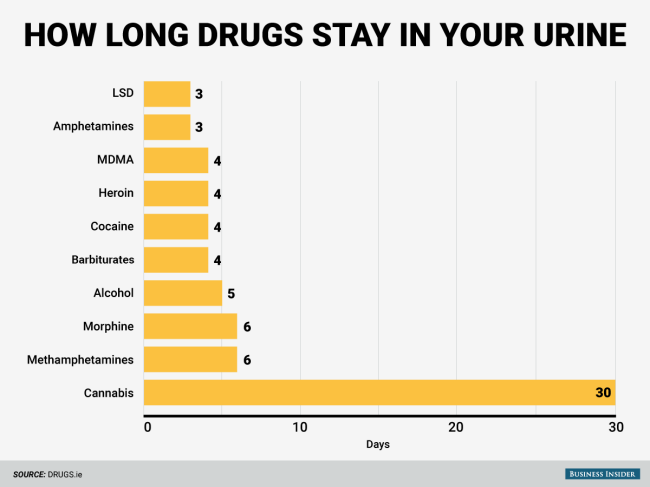 Business Insider - yimg.com
Business Insider - yimg.com
Urine tests can't determine whether a person is actively "high" on marijuana because they don't detect the drug's main, psychoactive ingredient THC. Urine tests can only detect the byproduct, called carboxy-THC, which appears in urine after the body metabolizes THC. In other words, drug screens don't test for impairment; they simply detect the metabolites of drugs a person has recently used.
Because the metabolite of THC is fat soluble, however, it can be detected in urine for 30 days or more. In contrast, the metabolites of other illegal drugs — cocaine, heroin, and meth, for example — are water soluble and are flushed out of the system in one to two days on average and are therefore undetectable on a urine test thereafter. As a side note, after a person inhales cannabis, THC is only active for one to four hours on average.
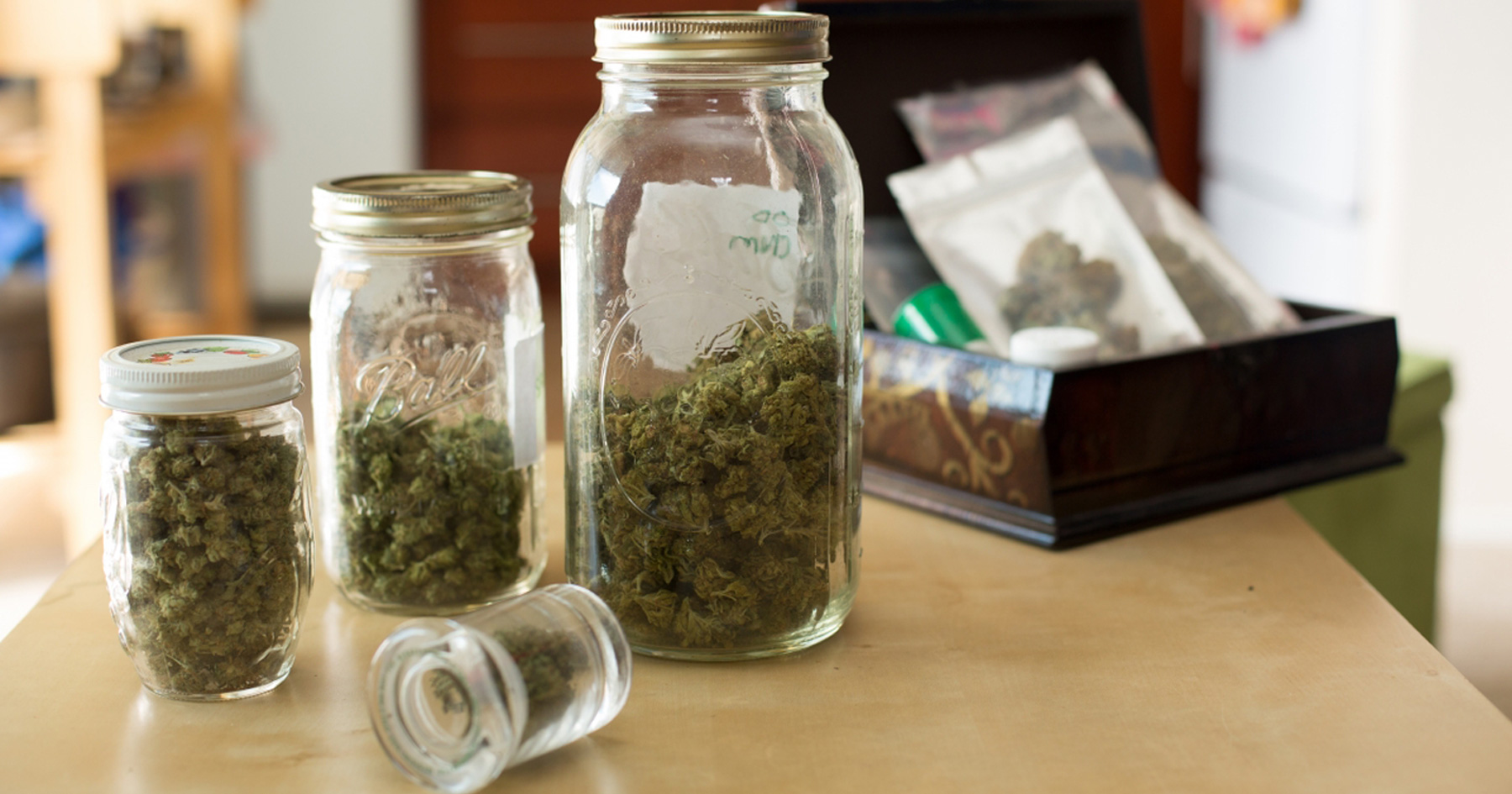 Drug Policy Alliance - drugpolicy.org
Drug Policy Alliance - drugpolicy.org
"Not only is urine testing for marijuana not an impairment test, testing positive for carboxy-THC on a urine screen is arguably evidence of non-impairment, because the test has established that enough time has elapsed so that the active drug has worn off, and a significant portion — if not all — of that active substance has been converted into something else that is inactive," Armentano said.
Jason Williamson, a senior staff attorney at the ACLU's Criminal Law Reform Project, agreed.
"Someone passing or failing a drug test has no bearing on whether or not they're going to be impaired at the job two weeks later," Williamson told ATTN:. "I think that's a huge piece of the puzzle that I'm sure drug-testing companies don't need or want to talk about, but that public institutions and private industry should be considering."
Why, then, does the Drug and Alcohol Testing Industry Association — the largest drug-testing trade group in the country, representing more than 1,200 members — insist that "impairment lasts a minimum of 24 hours" after marijuana use?
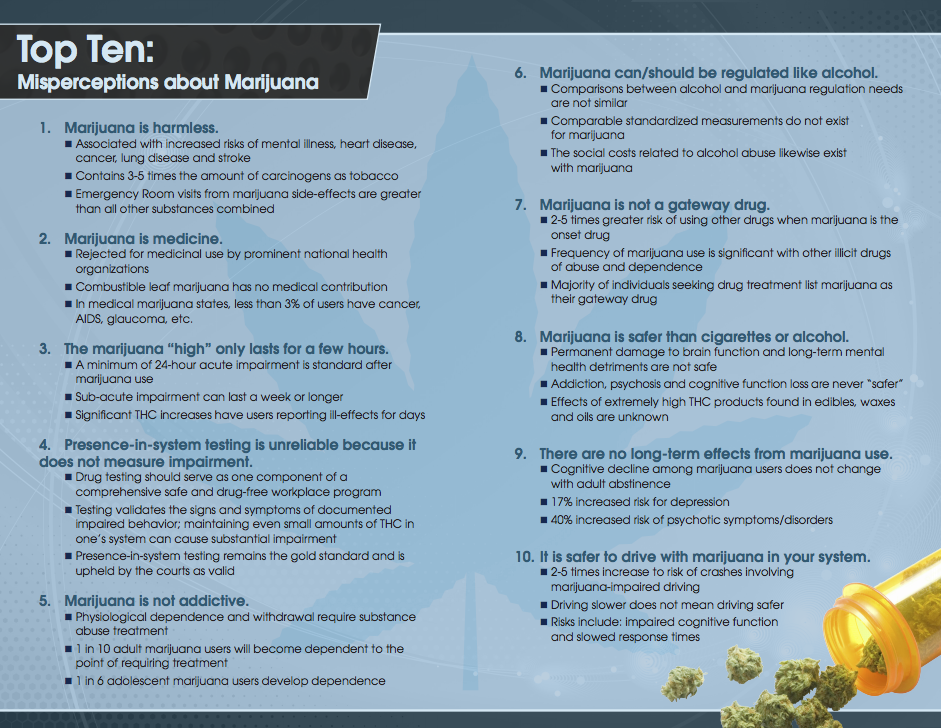 DATIA - datia.org
DATIA - datia.org
DATIA keeps a list of 10 "myths" about marijuana on its website, including one that disputed the claim that "the marijuana 'high' only last for a few hours." To support that point, the association cited a 1985 study of airline pilots who used flight simulators after smoking a joint. "While impairment was proven 24 hours after usage, none of the pilots reported any awareness of their own impairment," DATIA wrote. But a follow-up study conducted in 1989 found that the psychoactive effects wore off after one to four hours.
The list is only one part of DATIA's efforts to "educate" individuals and companies interested in drug testing.
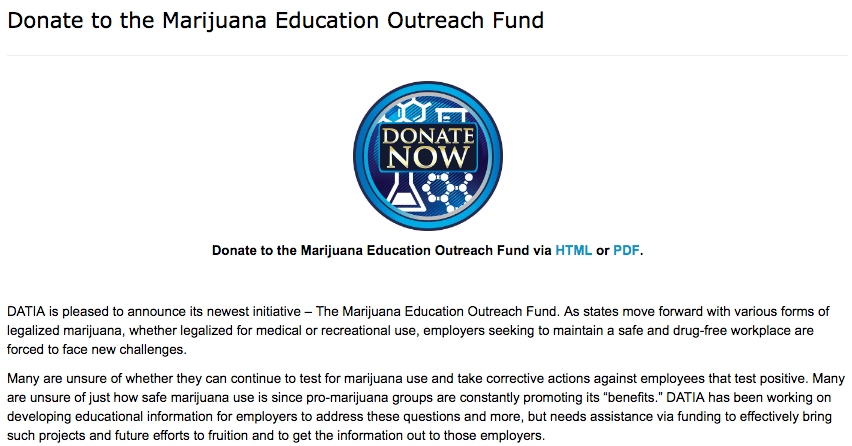 DATIA - datia.org
DATIA - datia.org
The organization is also raising money for its "Marijuana Education Outreach Fund," a recent initiative meant to "advocate for employers’ rights to a safe and drug-free workplace" and to fund research about marijuana's effects on the workplace, risks associated with a "lack of consistent policy enforcement," and instructions on how to comply with laws in states where marijuana is legal, "while maintaining an effective drug-testing program."
ATTN: asked DATIA for information about how these funds are being distributed and sought clarification on the association's marijuana policy, but a representative said that the questions would first have to be approved by its board of directors. DATIA has not responded to multiple calls and emails following up on this inquiry. We will update the story once those comments are received.
A central focus of the Marijuana Education Outreach Fund appears to concern employers' rights to mandate drug testing, even in states that have legalized marijuana. Legalization advocates want states to restrict the ability of employers to penalize marijuana users in legal states. So far, no state-level legalization measures include such exemptions, Forbes reported.
DATIA and other players in the drug-testing industry want to keep it that way.
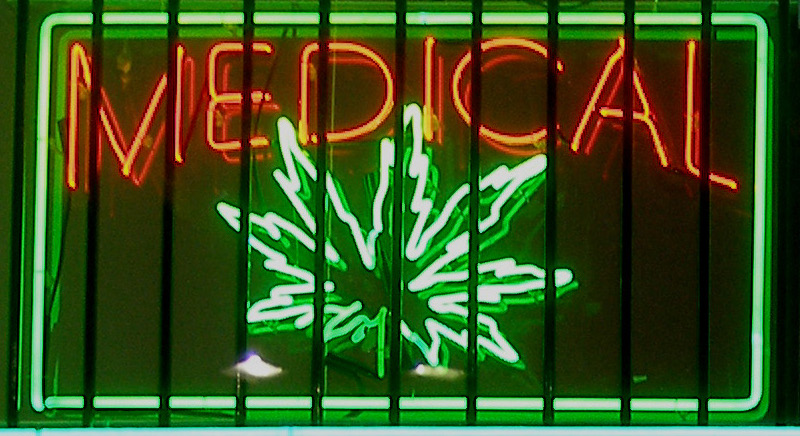 Wikimedia - wikimedia.org
Wikimedia - wikimedia.org
The Institute for a Drug-Free Workplace, a nonprofit corporation based in Virginia, is another arm of the drug-testing industry that actively resists marijuana legalization at the state and federal level. Its executive director, Mark de Bernardo, is a partner at Jackson Lewis, a D.C. firm, where he represents clients in the drug-testing industry and anti-drug movement.
Between 2015 and 2016, Bernardo's Institute for a Drug-Free Workplace spent $20,000 on lobbying efforts supporting the "enforcement of federal laws against distribution and use of Schedule I drugs," according to lobbying reports. Marijuana is a Schedule 1 drug, which means the federal government considers it as dangerous and addictive as hard drugs such as heroin.
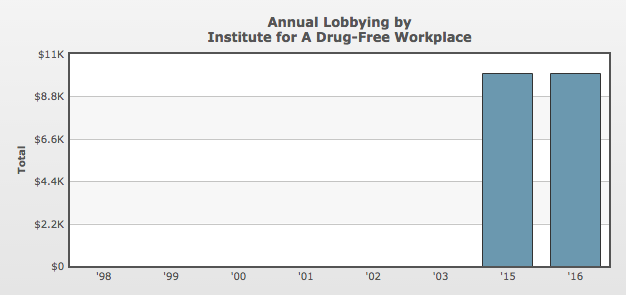 OpenSecrets - opensecrets.org
OpenSecrets - opensecrets.org
In an op-ed published in the National Law Review last year, Bernardo boasted about how workers in legal states have consistently failed to challenge employers' rights to penalize medical marijuana patients for testing positive for THC.
"This litigation results from a clash between a culture that increasingly accepts marijuana and companies that prohibit illicit drug abuse because of legitimate safety and productivity concerns," Bernardo wrote. "The conflict ultimately will be resolved by Congress or the courts (four lawsuits [which Bernardo reportedly financed] currently are pending to invalidate Colorado’s legalization of marijuana)."
It's not just DATIA and the Institute for a Drug-Free Workplace. It's virtually impossible to find any drug-testing industry associations that support marijuana legalization.
The Drug Free America Foundation — a nonprofit organization that counts two former DEA administrators, Michele Leonhart and Karen Tandy, among its advisory board members — runs the National Drug-Free Workplace Alliance. To get a sense of the organization's stance on legalization, watch this video DFAF posted on its website for employers who are considering dropping marijuana from their drug tests; describing the dangers of having marijuana users in the workplace, the video is clearly meant to scare employers away from dropping marijuana from their drug testing policy.
The drug-testing industry is out of step with the public on the issue of legalization, and some believe there's an implicit conflict of interest when it comes to drug testing companies and marijuana reform.
In light of historic public support for legalization and mounting evidence that marijuana is relatively safe, non-addictive, and medically valuable, it seems odd that the drug-testing industry would focus so much of its energy and resources fighting legalization. If drug tests can't determine if a person is actively impaired, all they can tell employers is that an individual used the drug within the last month or so. Reform advocates think that's reason enough to drop marijuana from drug-testing programs in legal states.
After all, millions of Americans manage to stay productive in the workplace even after consuming alcohol when they're off the job.
Employers shouldn't have to tolerate workers who show up to the office drunk, nor should they have to make exceptions for employees who get high on the job. But requiring people to pee in a cup and punishing them for testing positive for marijuana doesn't necessarily help employers achieve a drug-free workplace, legalization advocates said.
"Because of continuing federal prohibition, the drug-testing industry is able to get away with making money off of getting otherwise productive people fired from their jobs just because they happen to enjoy marijuana at the end of the day, in the privacy of their own homes, in a way that doesn't negatively impact their work," Tom Angell, the founder of the Marijuana Majority, told ATTN:.
"The drug-testing industry should be warned, however, that as more states change their laws, the federal government is going to feel greatly increasing pressure to get on board. When that happens, this easy-money racket is going to come to an end."
ATTN: reached out to DATIA, the Institute for a Drug-Free Workplace, the Drug Free America Foundation, and Quest Diagnostics for comment on this report.
Quest Diagnostics answered questions on background but declined to comment on the record on the potential effects of federal marijuana legalization on the drug-testing industry. The company advised ATTN: to direct its questions to federal drug and transportation agencies, in addition to the Institute for a Drug-Free Workplace.
